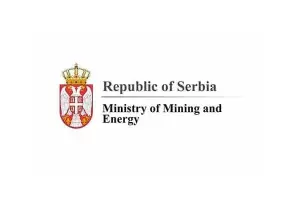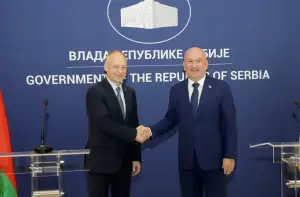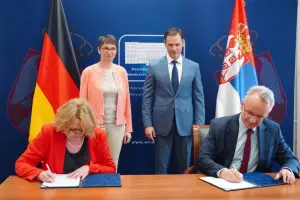- Serbia
Get to know Serbia
- Citizens
Culture and science
Health services
Pension and disability insurance
- Business
Employment
Economy
- Media
- Government
- Contact
Keep in touch
Contact form
Back
Keepin touch
Whether you have a question, comment, suggestion or any problem in the purview of the government, send us your message and we will try to respond as soon as possible. If your problem is not in our purview, we will forward your message to the relevant institution.
Q:
A:
Serbia, Bosnia-Herzegovina sign agreement
Belgrade/Sarajevo,
27 March 2009
Serbian Deputy Prime Minister and Minister of Economy and Regional Development Mladjan Dinkic and Bosnia-Herzegovina Minister of Foreign Trade and Economic Relations Mladen Zirojevic signed today in Sarajevo an agreement on economic cooperation which will improve cooperation in all areas important for the development of the two countries.
After signing the agreement Dinkic said that he believes that the Balkans region countries should turn to each other to deal with the conditions created by the global financial crisis.
The trade between Serbia and Bosnia-Herzegovina stood at $2 billion in the previous year, which is a good result. Unfortunately both Serbia and Bosnia-Herzegovina, like the rest of the world, are hit by the global financial crisis and both countries will need to reduce foreign trade this year, said Dinkic.
He said that the processes for further EU integration of the Balkans countries that were earlier intensified will now slow down and the countries of the region have no choice but to cooperate better and to strengthen their economies in preparation for EU integration.
Zirojevic said that the agreement signed today is very important, recalling that Serbia and Bosnia-Herzegovina have a tradition of partnership and that Serbia is the biggest foreign investor in Bosnia-Herzegovina.
Serbia has invested nearly €800 million in Bosnia-Herzegovina, which is 22% of the total investments registered until now, said Zirojevic.
The trade between Serbia and Bosnia-Herzegovina stood at some $2 billion last year, which makes Bosnia-Herzegovina one of Serbia’s most important economic partners and the agreement signed today will make it possible to further strengthen relations and will open up new opportunities.
Dinkic also met today in Sarajevo with Deputy Minister of Communication and Transport Veselin Poljasevic, the Governor of the Central Bank of Bosnia-Herzegovina Kemal Kozaric and President of the Foreign Trade Chamber of Bosnia-Herzegovina Mahir Hadziahmetovic with whom he talked about the measures which Serbia is taking to deal with the effects of the global financial crisis and the arrangement that was reached between Serbia and the IMF.
Bosnia-Herzegovina officials informed the Serbian delegation that Bosnia-Herzegovina will also begin talks with the IMF at the beginning of April.
The trade between Serbia and Bosnia-Herzegovina stood at $2 billion in the previous year, which is a good result. Unfortunately both Serbia and Bosnia-Herzegovina, like the rest of the world, are hit by the global financial crisis and both countries will need to reduce foreign trade this year, said Dinkic.
He said that the processes for further EU integration of the Balkans countries that were earlier intensified will now slow down and the countries of the region have no choice but to cooperate better and to strengthen their economies in preparation for EU integration.
Zirojevic said that the agreement signed today is very important, recalling that Serbia and Bosnia-Herzegovina have a tradition of partnership and that Serbia is the biggest foreign investor in Bosnia-Herzegovina.
Serbia has invested nearly €800 million in Bosnia-Herzegovina, which is 22% of the total investments registered until now, said Zirojevic.
The trade between Serbia and Bosnia-Herzegovina stood at some $2 billion last year, which makes Bosnia-Herzegovina one of Serbia’s most important economic partners and the agreement signed today will make it possible to further strengthen relations and will open up new opportunities.
Dinkic also met today in Sarajevo with Deputy Minister of Communication and Transport Veselin Poljasevic, the Governor of the Central Bank of Bosnia-Herzegovina Kemal Kozaric and President of the Foreign Trade Chamber of Bosnia-Herzegovina Mahir Hadziahmetovic with whom he talked about the measures which Serbia is taking to deal with the effects of the global financial crisis and the arrangement that was reached between Serbia and the IMF.
Bosnia-Herzegovina officials informed the Serbian delegation that Bosnia-Herzegovina will also begin talks with the IMF at the beginning of April.
-
 Belgrade, 11 August 2025
Belgrade, 11 August 2025Support for agricultural projects worth RSD 750 million
-
 Belgrade, 21 July 2025
Belgrade, 21 July 2025Construction of oil pipeline with Hungary to begin early next year
-
 Belgrade/Athens, 17 July 2025
Belgrade/Athens, 17 July 2025Serbia continues to align with EU in field of energy
-
 Kostolac, 14 July 2025
Kostolac, 14 July 2025First solar power plant Petka in Kostolac put into trial operation
-
 Belgrade, 11 July 2025
Belgrade, 11 July 2025Potential for improving cooperation with Belarus in many areas
-
 Požega, 5 July 2025
Požega, 5 July 2025Section of Pakovraće - Požega highway officially opened
-
 Belgrade, 2 July 2025
Belgrade, 2 July 2025Technical specifications defined for Serbia-Hungary oil pipeline
-
 Belgrade, 30 June 2025
Belgrade, 30 June 2025IMF confirms Serbia successfully implementing all agreed reforms
-
 Belgrade, 27 June 2025
Belgrade, 27 June 2025Double Taxation Avoidance Agreement with Germany signed
-
 Kostolac, 25 June 2025
Kostolac, 25 June 2025Construction of Kostolac wind farm nearing completion
